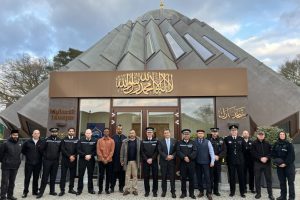
© Shutterstock
Hazrat Mirza Bashiruddin Mahmud Ahmad (ra), Second Worldwide Head of the Ahmadiyya Muslim Community
Translated by Professor Amtul Razzaq Carmichael for The Review of Religions translation team.
The Review of Religions takes full responsibility for any errors in translated.
Summary of the sermon delivered on 24th August 1953 at Ahmadiyya Hall, Karachi
Young People’s Responsibilities
We see that in this world, Allah the Exalted has set up the circle of life and death. People are born, they live their lives and then pass away from this world after some time. It is the role of the youth to fill the void left by the death [of their elders]. If the condition of the youth is as good or better than that of their predecessors, then the nation is safeguarded from decline and continues to advance on the path of progress. However, If the youth do not live up to the standards of the collective moral fabric of a people, the nation’s future becomes bleak.
Indeed, the progress of a nation depends upon its youth. For example, if every soldier in an army thinks that they themselves may become the commander-in-chief someday, they will certainly shape their actions and character in line with this feeling until they eventually become worthy of such a rank. As a result, a time will come when all the soldiers in that army will develop the capabilities to become the commander-in-chief. However, if every soldier in the army thinks that they could never become the commander-in-chief, then the condition of such an army will decline to the point that even after searching, they would not be able to find a single soldier who is able to shoulder the responsibility of this high office. Therefore, for the progress of the community, it is necessary that every member of the community feels that there is no high office the responsibilities of which they cannot do justice to. Until every person aspires to make progress with this mindset, as a nation, those skills cannot be attained that are required for its defence, survival and progress. Therefore, each one of you should strive to prove that, when the time comes, they can fulfil the responsibilities of the highest offices.
Perfect Knowledge and Perfect Action
To succeed in this grand endeavour, two things are required: perfect knowledge and perfect action. To have perfect knowledge demands that one studies thoughtfully the community, religion and politics of the nation they belong to. Similarly, for perfect action, one needs to have discipline and to rigorously follow the system of the community. One should have creativity and the ambition to make progress. Until someone has these qualities, they cannot develop the aptitude to advance and make progress.
The Path to Progress Is Never-ending
For a nation, there is no stage that can be regarded as the ultimate or final stage of progress. There has never been a nation in the world that claimed that it had reached such a stage of progress that no further advancement was possible. The Holy Qur’an has described the majesty of Allah the Exalted as:
كُلَّ يَوۡمٍ هُوَ فِي شَأۡنٖ
“Every day He reveals Himself in a different state.” [2]
The word Sha’nin means a state which is unexpected and extraordinary. So, this verse كُلَّ يَوۡمٍ هُوَ فِي شَأۡنٖ would mean that in accordance with the attributes of God Almighty, He brings about changes in this world every day; changes that are remarkable and surpass those that occurred before them.
High aspirations mean that a person sets himself a goal that is greater than his present condition. Then he considers which resources are needed to achieve this goal.
Therefore, human beings, who are tasked with undertaking the affairs of this material world, have also been created to strive continually. There is no stage in life where human beings can think themselves exempt from hard work, accomplishment and endeavour. To achieve the greatest possible outcomes of their efforts, it is necessary for human beings to have high aspirations and ambitions. Whenever humans abandon their high aspirations and ambitions, their efforts will remain unsuccessful.
Definition of High Aspirations
The biggest weakness of a subjugated nation is that it loses its habit of pondering and deliberating. From morning to night and from night until dawn, its people are engrossed in the present and do not give any thought to the future. And even if they do think about the future, their thoughts never go further than unrealistic or fanciful ideas. They do not concentrate on any projects and schemes. They may have ideas, but are not able to put them into practice. Whereas to plan for a venture requires one to set a goal or a target, work out the resources required to achieve the target and work out the type of labour needed to complete the project. In other words, high aspiration means to ponder over how to procure the resources required after having identified them.
High aspirations mean that a person sets himself a goal that is greater than his present condition. Then he considers which resources are needed to achieve this goal. When a comprehensive plan for resources is formed, he then ponders how to acquire those resources. When a person sets himself on such a path, resources then become available on their own, and he eventually attains the targets he set out to achieve. If this process is not followed, then this is not an aspiration; it is mere fantasy and delusional. Such a person will always be lost in daydreaming. So, the youth of our community must develop the habit of contemplation, deliberation and having high aspirations.’
Method of Inculcating the Habit of Deliberation and Reflection
At this stage, Hazrat Musleh Mau’ud (ra) gave examples to explain how one can successfully reflect and deliberate. He said:
‘For example, you read an activity report in Al Musleh [3] from the United States or Holland. It is not enough to just read the report and familiarise yourself with the situation there. Rather, reading the number of new Muslims in these countries should automatically make you reflect: at what rate are people accepting Islam Ahmadiyyat in that country? How long has a mission been established there and how many people have joined Islam Ahmadiyyat in that time? After calculating the rate of new converts, you will be able to estimate how long it would take for the whole country to accept Islam, and how long can we expect before the whole world accepts Islam? If, by looking at the rate of Bai’ats [pledge to join Islam Ahmadiyyat], you deduce that it would take hundreds or thousands of years for this country to accept Islam – which, on the surface, appears to be the case – then you must deliberate about how to make preaching efforts more fruitful. Here, you cannot give yourself the false reassurance that our role is to do the preaching and the outcome is in the hand of God Almighty, and hence, if the desired outcome is not achieved, it is not our fault. Indeed, there is no doubt that the ultimate result of preaching is in the hand of Allah, but God is not so unjust that He would let someone’s sincere efforts go to waste. Then, one would have to ask, why did God not let the efforts of Abraham (as) go to waste? Why did He not let the efforts of Noah (as) go to waste? Why did He not let the efforts of Moses (as) go to waste? Why did He not let the efforts of Buddha (as) go to waste? Why did He not let the efforts of Ramchandar (as) go to waste? The answer is clear. They fulfilled their responsibilities as was required of them. Therefore, after reflection, you will be motivated to accelerate your efforts rather than live with false reassurance and do nothing.
To state that we failed because the result was ultimately in the hands of God is totally wrong. Anyone uttering such things is a mischief-maker. Indeed, it is true that the outcome is in the hands of God ultimately, but God decides this outcome for a reason. Our God is a principled God; He is not a dictator. His every act is full of wisdom. God does not reward people based on some random whim. God Almighty says that if you strive hard with consistency, We will reward you, and if We do not reward your hard work, then We will be unjust. If you work with due diligence, then there is no reason why He would not reward you. Indeed, the final decision is in the hands of God, but to make the outcome dependent on our actions, God has devised some rules. Humans do not have the power to determine the outcome of their efforts, but it is within their grasp to facilitate God’s hand to attain the desired outcome.’
Another Example
Hazrat Musleh Mau’ud (ra) elucidated a practical way to incorporate deliberation and reflection by giving another example. He said:
‘When you are aware that the world is against us, you should also deliberate as to why it is against us. One answer to that could be that truthful movements always face opposition. This is true, but then you must ponder: Does this opposition continue forever? Did those of the past not find techniques to abate and suppress this opposition? Did Prophets Adam (as), Noah (as), Abraham (as), Moses (as) and Jesus (as) surrender to their hostility? If they did not accept defeat, then why should we? Why don’t we seek ways to cause this opposition to die out? If you deliberate, new avenues will open before you. Hence, everyone should make a concerted effort to think for themselves and not just rely on others’ deliberations.’
A commitment to hard work lifts a nation, and the spirits of such nations are not defeated by anyone’s demise.
Awakening the Senses
While shedding further light on ways to develop the habits of deliberation and reflection, Hazrat Musleh Mau’ud (ra) emphasised the importance of moral upbringing from childhood, and stressed the value of remaining mentally alert. He described some golden advice given by the Holy Prophet (sa) and gave illuminating anecdotes from the lives of the revered Imams and kings of Islam. Hazrat Musleh Mau’ud (ra) elucidated that if one is vigilant, then they can avoid many dangers and carve the path of success for themselves. Then, Hazrat Musleh Mau’ud (ra) again stressed the importance of contemplation. He said:
‘Get in the habit of contemplation and reflection in a dignified manner to develop spirit and motivation, so that when the time comes, you are able to shoulder even the greatest of responsibilities.
A commitment to hard work lifts a nation, and the spirits of such nations are not defeated by anyone’s demise. The Holy Prophet (sa) instilled a spirit of industriousness in his companions by training them to reflect and deliberate. This is the reason that the death of anyone did not leave a vacuum. At every stage, a natural leader emerged, and under his leadership, Muslims continued to scale through these stages of success.
Thus, we see that at the time of the demise of the Holy Prophet (sa), Hazrat Abu Bakr (ra) came forward, filled that vacuum and ensured that the nation would not become disheartened. At that time, addressing the companions, Hazrat Abu Bakr (ra) said, “Anyone who believed that Muhammad (sa) was his god, should know that his god has died today; but those who believe in the God Who is Living and Self-Subsisting and All-Sustaining, Who sent the Holy Prophet (sa), have no need to despair, because He is Alive and will never die.”[4]
So, everything should be done after due thoughtfulness and reflection. If you get used to this, then each one of you will become capable of leadership. What safeguards nations from danger is that every member of that nation has the capacity to become the leader. When the skills of leadership become commonplace in a nation, there is no need to search for a leader. At such a time, leadership emerges automatically, and nations never face bewilderment or distress. It is true that nations can face crises: they could be massacred or exiled from their homes, but if the nation is used to thoughtful deliberation, then they can find a way to survive these.’
(Al-Musleh, 25th August 1953)
ENDNOTES
1. Karachi was the capital city of Pakistan from its inception in 1947 up until 1959. Thereafter, the then-president Ayyub Khan decided to build a new capital city called Islamabad. In the interim period, he moved the capital city from Karachi to Rawalpindi. Islamabad officially became the capital of Pakistan on 14th August 1967. (Publisher)
2. The Holy Qur’an, 55:30.
3. Al-Musleh was a newspaper launched by Ahmadiyya Muslim Youth Association of Karachi in 1950. It aimed to showcase their activities, promote religious, educational, and preaching interests among the youth, and remove misconceptions about Ahmadiyyat. (Publisher)
4. Sahih al-Bukhari, Kitab al-Maghazi, Bab Marad al-Nabi (sa) wa Wafatih.




Comment Title: Nurturing Leadership Skills of the Youth — A Qur’anic Perspective
This article is a timely reminder that the strength of a nation lies in its youth. As Hazrat Musleh Maud (ra) beautifully emphasized, leadership must be nurtured through knowledge, discipline, and reflection so that responsibility can be carried with resilience. The Holy Qur’an reassures us: ‘Allah does not burden a soul beyond that it can bear’ (2:287), reminding young people that they are capable of rising to the challenges of leadership. Likewise, Surah Al-Asr teaches that true success lies in faith, good works, and mutual encouragement in truth and patience (103:1–3). The Qur’an emphasizes unity and steadfastness (8:47). Leadership among youth must be rooted in cooperation and perseverance, so that strength is never lost through division. These qualities—steadfastness, industriousness, and high aspirations—are the foundation of leadership that sustains communities across generations. May our youth embody these Qur’anic principles and step forward with humility and strength.
I end my comment with:
‘And as for those who strive in Our path — We will surely guide them in Our ways. And verily Allah is with those who do good.’ (29:70)
May our youth embody these Qur’anic principles and step forward with humility and strength. May Allah’s guidance and support be with us, for in Him lies all success. Truly an amazing article, thank you for sharing.
The Qur’anic references aligned with alislam.org numbering.